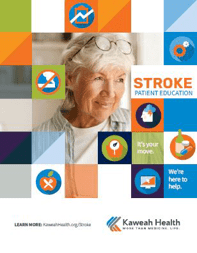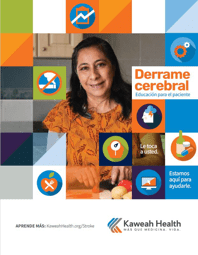Education and Resources
What is a stroke?
A stroke occurs when a blood vessel bringing blood and oxygen to the brain gets blocked or ruptures. When this happens, brain cells don't get the blood that they need. Deprived of oxygen, nerve cells stop working and die within minutes. Then, the part of the body they control cannot function either.
How do you recognize a stroke?
Getting to the hospital for emergency services is the most important thing. Early recognition and prompt arrival at the nearest Emergency Department enables the physicians to provide life saving treatments and/or medications if appropriate. Don't ignore these warning signs, even if they go away. A quick and easy way to spot a stroke and to educate the public is by using the acronym BE FAST:
What types of strokes are there?
Ischemic Stroke occurs when blood vessels to the brain become narrowed or clogged with fatty deposits called plaque, cutting off blood flow to brain cells. High blood pressure is the most important risk factor for ischemic stroke that you can change.
Hemorrhagic Stroke happens when a blood vessel ruptures in or near the brain, and blood collects in the brain tissue. This is toxic for the brain tissue and will cause the cells in that area to weaken and die.
How is stroke diagnosed?
The most important factor is to get someone experiencing stroke symptoms to the hospital as soon as possible. Diagnosis can involve various factors including review of medical history, physical and neurological examination, laboratory blood tests, CT or MRI scan or other diagnostic tests.
How are strokes treated?
Acute treatment is the immediate treatment given by a healthcare team when a stroke happens and can include clot bursting drugs, blood pressure medication and other drugs to treat brain swelling that sometimes occurs after stroke. The goal of acute treatment is to keep the amount of brain injury as small as possible. Depending on the type and severity of the stroke surgery may be required.
Are the effects of stroke permanent?
The effects of stroke may be permanent, depending on how many cells are lost, where they are in the brain, and other factors. Timing is important so dial 911 as soon as symptoms appear.
Download Patient Education Booklet
Other Downloads
More Information
Setting up Medical ID on your smartphone is FREE, and it could save your life.
If you were injured or unconscious, would emergency medical personnel
be able to access your phone for important medical information? If not,
this is for you.
WHY DO IT? Setting up Medical ID on your phone can give first responders access to critical medical information, even if your phone is locked.
This information can be shared with emergency care providers, and makes it possible for your emergency contacts to be notified.
- Set up your Medical ID
- Show family and friends how to set their Medical ID
- Set a repeat reminder to ensure Medical ID is accurate
Itʼs simple! Use the following links to access step-by-step instructions for setting up your Medical ID on your smartphone. Itʼs easy, and it could save your life!
Articles on health equity from the American Heart Association
The Urgent Need for Health Equity
Everyone has an optimal, just opportunity to be healthy. But this is not the reality for many people of color and others whose health suffers because of social factors beyond their control. People suffer when they lack access to quality care, nutritious food, and other basic health needs.
Learn about the 2024 Health Equity Impact Goal.
Mounting 'social determinants' could magnify stroke risk
The cumulative effect of several social factors can more than double the risk of stroke in people under 75, according to new research that examined the impact of living in a poor or rural area, having low education or income level, lacking health insurance, or being Black.
Environment, culture, other social determinants play big role in heart health
Social determinants of health are factors that influence where and how people live, learn, work and play. They provide context to a person's life and can play just as big of a role in affecting health as medications and physical lifestyle changes.
Learn how social factors of health influence a person's cardiovascular health.
Source: Stroke.org/en/About-stroke/Stroke-risk-factors
Think FAST Rap Version
Performed by Nurse Master Charlie, RN. This is a throwback rap covers the different types of strokes and the signs and symptoms of strokes.


